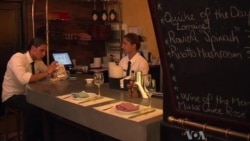BEIRUT —
Early evening in Ashrafieh, a Beirut district known for its nightlife, the Couqley Restaurant is getting ready to open for dinner.
Owner Ziad Kamel oversees the preparations. Business is tough. Since the Syrian war began two years ago, the number of tourists visiting Lebanon has fallen by more than a third. Tourism revenues are down by almost one-half.
“Lots of restaurants, lots of bars have had to shut down,” Kamel said. “Hotels have had to shut down, if not the whole hotel, they have had to shut down half the hotel and operate on a skeleton staff. Everyone is in crisis management at the moment, in downsizing mode, not in growth mode definitely.”
According to Kamel, his restaurant is still profitable, though barely, because it caters primarily to locals. But he had to close his flagship restaurant on the marina because it catered to wealthy foreign tourists who no longer come.
Due to the Syrian crisis, Lebanon's economy grew less than one percent last year, down from average annual growth of eight percent, says Byblos Bank's chief economist.
“The areas that have suffered the most are consumer confidence and investor sentiment,” said Nassib Ghobril. “And that has been reflected on economic activity and therefore on real GDP growth.”
In addition, nearly a half million Syrian refugees have streamed into Lebanon, putting a strain on government services, health care and infrastructure.
Ghobril believes says Lebanon's economy will quickly recover quickly if the Syrian conflict ends soon.
“A negotiated solution to the Syrian crisis would bring that positive political shock to Lebanon,” he said. “It would help consumer confidence and investor sentiment recover and, therefore, it would help economic growth pick up rather quickly given that the Lebanese economy is driven by the private sector.”
Kamel says Lebanese people are good at crisis management. Many businessmen have left but he feels it's important to invest in one's country.
“If all of us leave, then the people remaining here will certainly not be able to inspire enough change in the country for it to one day be normalized," he said.
A few hours later, Couqley Restaurant is open. Business is good. The conflict in Syria seems far away, but so does any end to it. And that is what worries Lebanese business people most of all.
Owner Ziad Kamel oversees the preparations. Business is tough. Since the Syrian war began two years ago, the number of tourists visiting Lebanon has fallen by more than a third. Tourism revenues are down by almost one-half.
“Lots of restaurants, lots of bars have had to shut down,” Kamel said. “Hotels have had to shut down, if not the whole hotel, they have had to shut down half the hotel and operate on a skeleton staff. Everyone is in crisis management at the moment, in downsizing mode, not in growth mode definitely.”
According to Kamel, his restaurant is still profitable, though barely, because it caters primarily to locals. But he had to close his flagship restaurant on the marina because it catered to wealthy foreign tourists who no longer come.
Due to the Syrian crisis, Lebanon's economy grew less than one percent last year, down from average annual growth of eight percent, says Byblos Bank's chief economist.
“The areas that have suffered the most are consumer confidence and investor sentiment,” said Nassib Ghobril. “And that has been reflected on economic activity and therefore on real GDP growth.”
In addition, nearly a half million Syrian refugees have streamed into Lebanon, putting a strain on government services, health care and infrastructure.
Ghobril believes says Lebanon's economy will quickly recover quickly if the Syrian conflict ends soon.
“A negotiated solution to the Syrian crisis would bring that positive political shock to Lebanon,” he said. “It would help consumer confidence and investor sentiment recover and, therefore, it would help economic growth pick up rather quickly given that the Lebanese economy is driven by the private sector.”
Kamel says Lebanese people are good at crisis management. Many businessmen have left but he feels it's important to invest in one's country.
“If all of us leave, then the people remaining here will certainly not be able to inspire enough change in the country for it to one day be normalized," he said.
A few hours later, Couqley Restaurant is open. Business is good. The conflict in Syria seems far away, but so does any end to it. And that is what worries Lebanese business people most of all.
Loading...





